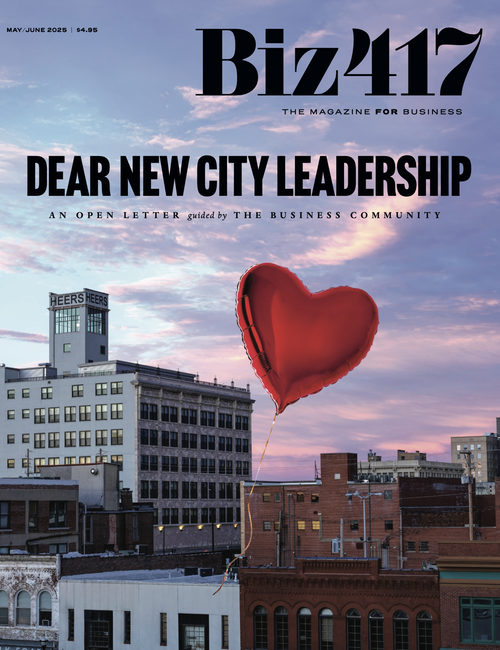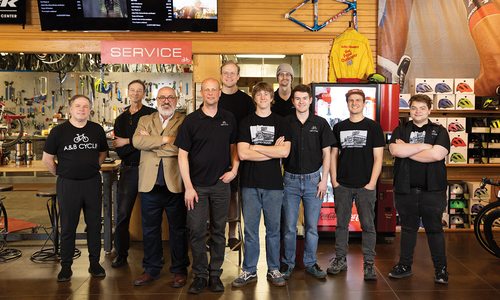
Startups
The Disruptors
Five local start-ups that are shaking up their respective industries.
By Claire Porter | Photos by Brad Zweerink
Jan 2016

Springfield’s entrepreneurial community is churning out great ideas faster than you can blink and disrupting the norm with skyrocketing start-ups. We’ve highlighted five of the best game-changers in the bunch.
Back Road to Success

When emergency first responders navigate unmarked winding rural roads, they often waste precious time when it matters most. Robb Woolsey founded Rural First to revamp GPS mapping and to make life equally safe for those living outside city limits.
Startup Stage: Fundraising and venture capital
Date Founded: August 2013
Number of Employees: 9, hoping to be 30 by the end of 2016
Funding: Venture capital
When you live in a rural area, you know your town like the back of your hand, and getting to where you need to go is second nature. But for outsiders, navigating unmarked streets means wasting valuable time. That very problem cost Robb Woolsey his mother’s life when first responders took 45 minutes to find his parents’ rural home, despite departing from an EMT station six minutes away. Woolsey realized he had all the tools to solve this problem by turning his GPS and mapping background into Rural First, a company bringing comprehensive rural maps to emergency first responders.
Mapping His Progress
Woolsey’s first foray into GPS technologies came nine years ago when he ran a route service company and decided to have a system built that would log each truck’s path at the end of the day. He discovered that his drivers were crisscrossing routes and running inefficiently. Using that knowledge, Woolsey was able to get his drivers on more streamlined routes, allowing them to see even more customers each day.
After selling the company, Woolsey worked for Alltel, now part of Verizon, selling GPS systems and managing government and state contracts. There he learned of the issues users face with GPS technologies such as complex menus and incomplete maps. Armed with that experience, and spurred on by his personal loss, Woolsey founded Rural First in August 2013.
The inspiration for Rural First was remapping the 97 percent of the United States classified as small town and rural for emergency first responders, but its clientele now includes public works, transportation, utility companies and commercial organizations. Rural First launched the American Rural Mapping Initiative, which works by contacting counties and asking for their map data, or, in some cases, their paper maps. Those maps then need correcting. For example, intersections might not be aligned properly or elevation levels might be missing, so mapping software ends up creating incorrect paths or overlooking faster routes. The Rural First team cleans and corrects the data and combines it with Department of Transportation and Voter Registration data. The team then inputs the data into their software and GPS tracking devices.
Cashing In On Clarity
A nationwide company was always Woolsey’s goal, which means he’s had to switch from a small business to a start-up mentality. The difference, he says, is that small businesses grow as they make income and aim to secure the local market. Start-ups, however, aim to disrupt an existing industry with a scalable business model and therefore have to move quickly. “You have to move so much faster to capture the opportunity to be the first and to disrupt [the industry] that there’s no way that you can grow by the revenue that you’re bringing in,” Woolsey says. “You have to move so much faster than that revenue.”
To supplement that revenue, Woolsey turned to outside investors. “I got in front of investors and failed miserably in how I presented [the company], and I realized that I wasn’t focused well enough,” he says. “You’re having to explain the business in such a way that they can grasp the vision of what you’re doing.”
“[Investors] really want to see that you’re focused on a narrow niche and that you’re not trying to boil the ocean,” he says. Clarity of vision isn’t just important for investors, it’s also the key to staying on track. Woolsey recommends sitting down and mapping out your entire business plan, then practice pitching the business to as many people as possible, and the further removed from you they are, the better. “Friends and family, they’re going to support you no matter what,” he says. “But they won’t have a clue what you’re talking about, so they’re not necessarily the right people.”
Leading With Culture
Though tedious, the clarifying process is crucial to your success. Woolsey says you need to believe in your vision so fully that you’re willing to do whatever it takes to make it happen, including foregoing a salary. “If you’re going in, you have to consider that you could lose everything, and then you have to be willing to work so hard that you don’t,” he says.
Woolsey is now on solid enough ground that he can begin building his team. The latest challenge is continuing Rural First’s rapid growth while maintaining the fun yet hard-working culture he’s built. “You really have to watch that culture, because if the culture goes, the company dies,” he says. He does this by hiring those with the right personality: sarcastic, driven but teachable. “My goal is to hire individuals who know massively more than I know in their area of expertise,” he says. “They still have to be coachable so that we’re all following the same vision.” Woolsey says.
So far, his hiring strategy has paid off. The team has pushed maps live for all of Arkansas, half of Missouri and some of Kansas and Illinois, and with the addition of several GIS interns, they hope to take their two-month-per-state mapping time down to two weeks. Rural First is now seeking fundraising and venture capital, putting the company one step closer to creating a 100-percent accurate, 100-percent mapped United States.
Accelerating Car Buying

When Josh Holstein founded CellARide, a text message–based car-buying tool, he coined the phrase “Information without the awkward conversation,” allowing users to start the car-shopping experience from the comfort of their phones.
Startup Stage: Preparing for exit
Date Founded: 2010
Number of Employees: 5
Funding: Friends, family, seed funding, pre–series A funding
One day as Josh Holstein, founder and CEO of CellARide, was driving down the street, he saw a for-sale sign taped to a car and started thinking about all of the questions a buyer wouldn’t think to ask, and all of the answers the owner might not know. From that reverie, CellARide was born. CellARide users can text a RIDEtag, or identification number listed on the car, and instantly receive a brochure with the photos, a test drive video, vehicle history and CARFAX information, all from the convenience of their phones. “I coined a phrase: Information without the awkward conversation,” Holstein says. After taking off and partnering with dealerships, CellARide is preparing for some high-level partnerships into 2016 that would prepare the company for an exit. [Editor’s Note: An exit is when investors or owners get rid of their stake in the business, often by selling out or by going public with an IPO.]
Biz 417: How have you had to pivot your business model since launching?
Josh Holstein: I’ve never worked a day in my life in the dealership business, and it’s difficult to go door to door unless you’ve worked in the industry. After we went through the Capital Innovators accelerator about a year and a half ago, I took a top-down approach. [Editor’s Note: a top-down approach goes straight to the big players in the industry, such as manufacturers and marketers, who can distribute a product or service to the dealerships they control.] I realized the bottom-up approach was very expensive and time consuming—especially when you’ve never worked in their shoes. Taking the top-down approach was very risky, but it paid off for us. Our clients have become more of what we call the tier one and tier two clients, the Original Equipment Manufacturers (OEMs) as well as the large marketing firms. We’re going at it from that perspective. We want to be the expert on the product, the software, and let someone else be the expert on the industry.
Biz: What has been your strategy to success?
JH: The main strategy was that the bottom up approach was insanity. We realized we needed to change something. We got into the right channels at the right time and got deals in place. Those deals then gave us the validation we needed in order to get other deals. It was kind of a domino effect at that point. Being part of a top-10 accelerator up in St. Louis also played into our success.
Biz: What steps did you take to launch CellARide?
JH: If you map a path to launching your start-up, I was all over the place. Then I came into The eFactory and started streamlining that path. I crafted a five-step process: You have an idea, you turn that idea into a product, product into a business, business into a company, company to exit.
Biz: How have you been able to grow so quickly?
JH: If the market comes to us and it’s not going to make us too wide-focused, we’re all about it. That’s what we’re about. We are so nimble. We’re agile; we’re able to move quickly where a lot of the big companies we’re working with, they can’t work that quick.
Biz: What resources are missing from our entrepreneurial community?
JH: Not too many people in this area understand the Software as a Service (SaaS) model or are willing to invest in it. My goal is to create a success story to provide more education and visibility around it. [Editor’s Note: The SaaS model is a web-based delivery method that provides clients with remote access to a centrally hosted software.]
Biz: What is the best piece of advice you would share?
JH: Make sure you know the resources that are in your community. If The eFactory had been here when I started in the idea phase, it would have sped up this process by two years. I got advice from Jim McKelvey [Co-Founder of Square], and he said, “If you’re going to fail, fail fast,” and that’s the truth. If you have a disruptive idea that is set to revolutionize an industry, don’t do what I did for two and a half years trying to figure it out.
Biz: What was one mistake that you made, and what did you learn from it?
JH: One of my first mistakes was I thought we were an automotive company and not a technology company. Once I realized that we’re a technology company using text messages to be a part of a revolution in the automotive industry, that’s when it all started clicking.
Off the Grid, Into the Green

Caleb Arthur is a do-it-yourself-er who learned how to install his own solar panels. Now, four years later, he’s turned that expertise and passion for a greener earth into the rapidly growing company Missouri Sun Solar.
Startup Stage: Looking to expand regionally and nationally
Date Founded: May 2012
Number of Employees: 60
Funding: Bootstrap
With a growing family comes growing expenses, and Caleb Arthur, CEO of Missouri Sun Solar, knew that bigger energy bills were coming his way. As a police officer in the Houston, Missouri, area, Arthur had a limited budget to make his home energy-efficient, so he decided to try building a straw-bale home including solar panels he installed himself. Going into the project, his intention was merely to lower his family’s bills. It wasn’t until he encountered a dangerous explosion while on duty that Arthur started to reevaluate his career. Inspired by his home-building experience, in May 2012, Arthur and his brother Luke founded Missouri Sun Solar, a company that not only makes energy more affordable for more families, but also actively works toward a cleaner, greener earth.
Bright Future, Big Savings
Missouri Sun Solar is what Arthur calls a total energy company and has associates who handle every stage of the process from securing bank loans and engineering the perfect solar package to securing permits and installing and wiring the panels they sell. The company starts by making the home or building more efficient, and then it uses solar power to offset the remaining energy costs. Arthur estimates that in the course of 25 years—the length of the panel’s warranty—homeowners can see $40,000 to $60,000 in savings. That customer-focused angle and a multitude of custom loan packages is what Arthur says sets Missouri Sun Solar apart.
Arthur had always had ideas for businesses in which to apply the people-first attitude he learned from his grandfather, who founded and ran water pump company ARPCO Pump, but he couldn’t find the right fit. “I had never found a job I was happy in before starting Missouri Sun Solar,” Arthur says. “I had lots of ideas, but no one would listen to them.” He found that achieving that happiness came after putting himself in the uncomfortable and risky position of starting his own business, a move that was not only fulfilling but gave him a competitive advantage. “Very few people put themselves in those uncomfortable positions,” Arthur says.
However, starting your own company doesn’t suddenly make you an expert. Arthur hired a business coach to help him be a more effective leader. “I thought I knew everything,” Arthur says, but after working with the coach, he learned not only that he couldn’t know everything, but also that being a good leader means being a good teacher. As your business grows, Arthur says, you can’t do everything on your own. “Write down everything you do in a day, and anything you can hire someone to do, hire them to do it,” he says.
Growth-Focused Strategies
Establishing a strong team was Arthur’s crucial step to success. Originally, Missouri Sun Solar operated out of St. Louis because utility companies there offered a rebate to homeowners whose electricity came from solar. Instead of directly competing with the existing solar companies, Missouri Sun Solar created alliances with them. These companies specialized in products and sales, but lacked installation capabilities. Arthur built up an installation team, and, in exchange for a percentage of the profits, his crew installed panels for those competitors. This strategy allowed Missouri Sun Solar to bring in large amounts of revenue with very little investment costs, and the company grew rapidly. When the rebate deal in St. Louis ended, Arthur moved the company to Springfield because of the available talent pool.
Leading with Advocacy
Strategic business alliances such as the ones Arthur formed in St. Louis also proved useful in the political advocacy role he plays. The ever-evolving guidelines and research on sustainable energy mean Arthur has a responsibility to represent the needs of solar companies within the energy industry. Fortunately, he has made connections to help him get his foot in the door. “Springfield is exciting because of the community,” he says. Leaders’ willingness to help others and the ability to get in front of key decision-makers helped Arthur climb to a leadership role in the Missouri Solar Energy Industries Association (MOSEIA). There, Arthur is responsible for educating energy representatives on the impact solar companies have had on job creation. He also lobbies for solar and renewable energy compensation programs, a challenging task for a small, newer niche within an industry full of mega corporations touting decades of clout.
That is gradually changing as solar companies gain traction in the state. Missouri Sun Solar is already outgrowing its new space, growth Arthur attributes to his hardworking team. “Find passionate, skilled people and give them the freedom to do what they need to do,” he says. To Arthur, surrounding himself with an eager and talented team means more than profits ever will. “If you’re passionate, the money will follow,” he says. He hopes to continue building that team as the company expands to the Columbia, Jefferson City and Kansas City markets and eventually spreads to the east coast.
Cashing In on Clean Cars

Alex Scott is no stranger to running businesses. He used his experience founding Springfield Parking Company to help him create his revolutionary waterless carwash company, Metro Shine.
Startup Stage: Spreading nationwide
Date Founded: 2012
Number of Employees: 35
Funding: Bootstrap
In 2008 when the economy was in decline, Alex Scott, owner of Metro Shine, noticed that airport parking companies were losing revenue because business travel was slowing down. As the owner of Springfield Parking Company, Scott was thinking of ways to help supplement that revenue without spending hundreds of thousands of dollars on a car washing facility. He decided to create a waterless carwash under a new company, Metro Shine, using three eco-friendly, water-based products: a prep spray, a tire shine and a carwash. Scott created, tested, developed and marketed the product in Springfield, where he currently runs the business, but since perfecting the formula, he’s focused solely on partnerships with commercial parking companies and international airports across the country in New York, New Jersey, Florida, Illinois and Colorado. After having juggled running his successful business with launching a start-up, all the while operating it long-distance, Scott is sharing his best advice for breaking through with a new business.
TIP: Go all-in, no matter what.
“If you’re willing to put the hours in, you have a good idea and you’re willing to adapt and change, if it’s going to be successful then it will be successful because of that. It won’t be because you didn’t try. I have to go in and work hard to figure out what this is going to be. I’ve got to spend money, I’ve got to stress out about it, I’ve got to go along with everything that comes with this. If you go all in, I’m not saying you’ll make it, but your chances will go up.”
TIP: It’s okay to wait to pursue your idea until you’re ready.
“Make sure you love what you’re doing, make sure you have the time, effort and means to do it, and also make sure you’re 100-percent ready to give it your all. If you’re not any of those three, don’t do it. Wait. There’s nothing wrong with waiting. If you have a really good idea, and it’s that good, wait. If you keep your eyes open, you’ll see an opportunity and say this really makes sense. You’ll get in there and maybe have a better opportunity to be successful because you did wait.”
TIP: Hold onto your safety net.
“Don’t quit your other job right off the bat. That’s why I have three or four other companies. I could go start another company because I’ve got employees, managers, I’ve got everything ready to go to allow me to concentrate on another company and not have to worry. I spent the time, effort, blood, sweat and tears in the first two or three years of [Springfield Parking Company] to get to that point. Sometimes you might not be to that point, and you just have to wait until you are. If you have an idea, and it’s a really good idea and you love it and you want it, how bad do you want it? Go do it.”
TIP: Let people poke holes in your idea.
“It makes you stop and think: Are they stupid, do they really know what they’re talking about or do they have a point? If it makes you think and gives you that empty feeling in your stomach, then it’s probably a good idea to take their advice. Go to somebody wiser, especially a pessimist. God bless pessimists. They’ll come up with something you never would have thought of. Go to a pessimist. Optimists are great, but they’ll optimize you right off the side of a cliff.”
TIP: Know that you’re going to make mistakes, and try to learn something from them.
“A lot of mistakes were made, and I’m probably still making some today. You just try to pick yourself up from them and try to learn from them if you can, and if you can’t, you can’t. Some mistakes you try to figure it out, but sometimes you just have to jump in with both feet thinking this might be a huge mistake, but you’ve got to do it anyway. I’ve done that many times.”
TIP: Don’t be afraid of trial and error. Constantly question your methods.
“There’s a lot of learning curve for each product. What’s the best way to apply it? What happens when it’s cold? It’s a waterless carwash, but the main ingredient is water, so it freezes. How do you train employees, and what’s the best process to do it. It’s not a job that you go to college and get a degree for, so turnover is high. What’s the best way to train people so that they can learn it quickly, be efficient and be really good at it in a short amount of time without a large learning curve? We didn’t know what it was going to be like and how well it was going to do. We thought it would be good, but we didn’t know how good. It’s been one of those things that’s been a great learning curve.”
TIP: Have a “Yes” attitude.
“Never say no to an opportunity. One of the things that I learned [while working at Convoy of Hope] is that unless it was horrible and didn’t make any sense, you always say yes to an opportunity. Never say no, maybe, or wait. Say yes, and do it right now. [For example, when handling contracts] on a big airport, you’re not just dealing with mom-and-pop, one person where that’s the only location they have. With a big international airport, they’re across the country. To be able to say yes we can service this contract here and we can also go anywhere you need us to be across the country and we can service those contracts as well. That has made us really appealing for many companies.”
Debate Goes Digital

Tim Dygon and Andrew Goodall know we live in an increasingly plugged-in world, and with The Daily Scholar, users can engage in educational content without taking their eyes off the screen.
Startup Stage: Developing a new beta product
Date Founded: July 2013
Number of Employees: 8
Funding: Investors
The availability of social media means anyone with access to a computer can post a thought in a matter of seconds with only a few clicks. College friends Andrew Goodall and Tim Dygon grew tired of the immediacy of social media and the lack of constructive dialogue surrounding online posts, so they decided to create a public platform in which users can engage in thoughtful, well-informed, civil discussions and debates over thought-provoking articles and content. They took that idea and turned it into The Daily Scholar (thedailyscholar.com), a custom-built site with more than 80,000 unique visits and a reach spanning 191 countries. Now that the site is gaining traction, Goodall and Dygon are focusing their attention on developing a beta software, Savant, to sell as a private admin-controlled publication platform on which users can host debates, publish articles, engage meaningfully and hopefully never post another half-baked rant online again.
BIZ 417: What do you wish you had known when you started?
Andrew Goodall: I wish I would have known how important it is to align yourself with people who are passionate in the same ways that you are. We’ve worked with individuals along the way that are interested for a while, but they don’t share that same passion. I think being able to differentiate between those people and focus your time and energy on the ones that you know share that same passion, that will just maximize your effort. We’ve spent thousands of hours doing this, and I think we could have maximized that better had we been with different types of people, or certain types of people. We also would like to have taken more advantage of the resources, expertise and wisdom of our advisory board.
BIZ: What strategy is crucial to success?
Tim Dygon: Especially when you’re developing a technology product, it’s important to have really good forethought, plan way far in advance and understand exactly what you want to do so you don’t engage in design creep. Avoid the tendency to endlessly add features so that you don’t make your software bloated to the point where it’s just not functioning like you want it to because you have a technological deficit.
BIZ: What is your best advice for new start-ups?
TD: Become your idea’s own worst enemy. Tear it down. Surround yourself with people that are critical. You don’t want to surround yourself with yes people that will tell you what you want to hear and tell you all the great things about what you’re doing. It’s really important to surround yourself with people who will ask those tough questions and will push you in a direction to where you do question everything.
AG: Even before that stage, if someone is thinking about starting up, they should run even that idea, the whole concept of starting a company, through a wringer. Ask, “Should I even start?” The starting of the start-up is almost more important than the start-up itself.
BIZ: What did you learn from the start-up process?
AG: One of the steps we took early-on was to identify people in our networks who would be willing to be financial contributors. We were able to make those connections, and we were able to secure first-round fundraising enough to proceed with what we had plans for. I think that if I had to go back and do it again, at the front end I would do even more seeking out of financial backup. Now that we’ve started, we’ve run into the barrier of people being in the wait-and-see phase. They’re really impressed with what we did, but because they don’t have ownership [from that initial fundraising stage], they want to wait and see what happens.
BIZ: What are some challenges of starting in a town of Springfield’s size?
AG: One of the things that we’ve seen just in the last two years, we’ve noticed that Springfield has started to shift just a little bit in terms of its saturation with small businesses and start-ups. The resources I would say are shrinking somewhat because there are a lot of development companies or individuals or capital investors who are, at this point, much more savvy, much more particular, much more specific, and they may already be committed, so while it’s very advantageous here, that’s a challenge too.

















